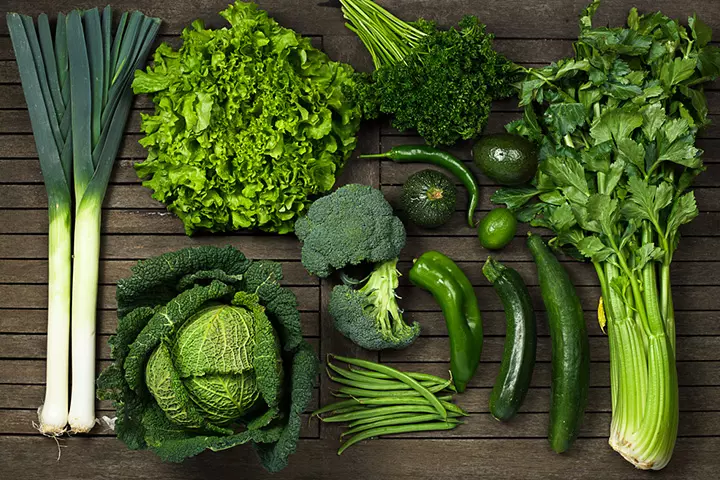
Image: Midjourney/ MomJunction Design Team

Experiencing dark or black stool during pregnancy is common and often not a cause for concern. In most cases, it can be attributed to factors such as dietary supplements, certain foods, food dyes, medications, or changes in digestion due to pregnancy (1). While avoiding the trigger may restore the stool color to normal, it is generally not advised unless underlying health issues exist.
However, if you experience any other symptoms or concerns, you may seek your doctor’s opinion during prenatal care, as certain conditions may signal health concerns that need medical attention. Read our medically reviewed post to know the common causes of black stool during pregnancy, and when you should seek medical advice.
Key Pointers
- The most common causes of dark stools among pregnant women are insufficient iron in the diet, bleeding, or certain medication.
- Constant constipation or hemorrhoids during pregnancy can also trigger dark stools.
- Consumption of foods like licorice and blueberries can initiate problems associated with dark stools.
- In some cases, dark stools may indicate a more serious condition, such as bleeding in the digestive tract.
- Pregnant women should maintain a healthy diet, drink plenty of water, and exercise regularly to prevent dark stools.
Common Causes Of Black Stool During Pregnancy
Black or tarry stools could be due to one or more of the following factors.
- Iron supplements: Doctors prescribe iron supplements if they see iron deficiency anemia. In some cases, your body cannot absorb, and this unabsorbed iron could give the stool a black or tarry appearance (2). A combination of iron-folic acid supplementation may also be responsible for black stool during pregnancy. According to a report published in the Journal of Pregnancy, side effects like black stool, along with constipation, diarrhea, and heartburn, are associated with shorter durations of iron-folic acid supplementation (3).
 Did you know?
Did you know?According to Dr. Alan Lindemann, obstetrician, who was also a clinical associate professor at the University of North Dakota, Grand Forks, “The iron in pills will be black even if the pills don’t look very dark. Bleeding from your rectum is not the same thing as black stool from taking iron supplements. It’s just that iron is turned black by your digestive tract, whether it’s coming from the iron in blood or from iron supplements.”
- Pigment-rich foods and food dyes: Certain foods, such as licorice and blueberries, may turn stools dark. Artificial food colors also can affect the color of the stool (4). You can identify the cause by maintaining a food journal.

Image: Shutterstock
- Prescription and over-the-counter medications: Medicines other than iron supplements might also cause the stools to turn black. Pepto-Bismol, which is one of the commonly used over-the-counter medications for an upset stomach, may also affect the stool color (5).
- Underlying gastrointestinal and health conditions: Digestive issues such as hemorrhoidsiSwollen veins in the anus or the lower rectum, and are also called piles , constipation, and anal fissures or tears during pregnancy (6) develop due to the increased pressure over the pelvic region, and this increases the odds of having fresh blood in the stool color.

Image: Shutterstock
- Internal hemorrhaging or bleeding: Gastrointestinal bleeding or bleeding within the digestive system, especially in the gastrointestinal tractiA pathway through which food enters the body, gets processed, and then exits the body. (that includes the esophagus, stomach, and small intestine), could lead to dark-colored stools (7). Melena refers to black stools due to gastrointestinal bleeding. The blood mixed with digestive juices can give a dark color to the stool. Complications of chronic illnesses such as colorectal cancer, Crohn’s Disease, ulcerative Colitis, and hiatal hernia may cause gastrointestinal bleeding that can also lead to blood in the stool.
 Health fact
Health factDr. Lindemann says, “If your stool is black, we say the blood is coming from higher up in your digestive tract because it is staying in your colon for a longer time, long enough to change the color to black. Although it is possible for you to have bleeding in your colon from a tumor, benign or malignant, it is extremely unlikely for a woman of 20 to 35 years. If you have a family history of colon cancer, you will probably want to have some kind of examination or testing after you deliver.”
Symptoms That May Accompany Black Stools
Depending on what the cause is, you may notice these symptoms along with black stools (4) (8) (9).
Benign symptoms
These symptoms are typically not a cause for concern and may occur with mild digestive disturbances, dietary changes, or iron supplementation. You may mention these during the next visit to your ob/gyn.
- Mild nausea
- Mild abdominal discomfort

Image: Shutterstock
Symptoms that need medical attention
If you experience any of these alongside black stools, seek medical attention:
- Fever: A fever accompanying black stools could indicate an infection.
- Severe abdominal and chest pain: Intense pain could suggest a more serious issue, such as ulcers, gastritis, or esophagitis.
- Lightheadedness or dizziness: Severe bleeding can cause blood pressure to drop, which may result in dizziness.
- Nausea or blood vomiting: Vomiting blood, often appearing as dark or coffee-ground material, can signal significant gastrointestinal bleeding.
If you notice dark color stools during pregnancy along with these symptoms for an extended period, especially if they occur without an apparent reason, consult your healthcare provider for antenatal care to rule out any adverse effects on maternal health and fetal development.
How Can You Avoid Black Stools During Pregnancy?
Changes in your diet, medication, and hygiene habits might help you avoid dark stools.
- Consume iron-rich food: To avoid dark poop due to iron supplements, try and get as much iron as you can from dietary sources. Include more of the liver, red meat, dark green leafy vegetables, and iron-fortified cereals in your diet. Unlike supplements, foods are easily absorbed by the body and may not result in dark stools. If supplements are needed, consult your healthcare provider to find the right dosage, as excessive intake may lead to black stools.

Image: Shutterstock
- Limit suspected foods: Temporarily avoid consuming foods like licorice, blueberries, or items with artificial food colors. Observe if the stool color returns to normal, which can help identify the cause.
- Avoid OTC medications: Do not take any medications without consulting your doctor, as they may have certain side effects, including change in stool color.
- Increase fiber intake: Consuming food rich in dietary fiber can reduce the risk of constipation and hemorrhoids, and also protect your gastrointestinal tract (10). It is good to consult a dietitian and get a meal plan that suits your body’s needs during pregnancy.
 Do remember
Do remember- Have a healthy lifestyle: Refrain from smoking and alcohol consumption to lessen the chances of irritation of the upper gastrointestinal tract (that could lead to bleeding and black stools) (11). Also, try some Kegel exercisesiExercises that help strengthen the pelvic floor muscles and help prevent postpartum urinary incontinence (only after doctor’s consultation) for improving muscle functioning around the rectal and vaginal areas. It can help regulate bowel movements and lessen the chances of constipation, bleeding, and other ailments.
- Stay hydrated: Sometimes, constipation due to dehydration can harden the stools as well as make them appear dark. So, drink at least 10 to 12 glasses of water, freshwater juices, and water-rich foods (cucumbers, watermelons) to avoid that.

Image: Shutterstock
How Is The Cause Behind Dark Stool Diagnosed?
The healthcare provider may study your medical history, do a physical examination, and order some tests. You may have to go for a combination of blood tests (Fecal Occult Blood Test), x-rays, and stool examinations. If the results are inconclusive, the doctor may ask you to go for an endoscopyiA diagnostic procedure that uses a long, flexible tube with an attached camera to observe the digestive tract that will examine the gastrointestinal tract and help identify the cause. Based on the tests and results, you will be given the appropriate treatment.
Aleah, a young mother, remembers experiencing dark stools while she was pregnant. She shares, “Something quite scary happened to me this week: I noticed I was having black poop. It terrified me because the trademark of a GI bleed is black stool. I didn’t think much of it initially and just let it slide. However, the next day it happened again, and then the day after that. At that point, I became concerned. I decided to go to an urgent care clinic to have it checked out, just in case.
One night, I went to urgent care. While waiting, they had to take a stool sample from me. Surprisingly, the color had returned to normal, and everything seemed fine again. We’re not really sure what caused it, but the doctors told me to come back immediately if there were any changes or if it recurred. Thankfully, it hasn’t come back, so I’m unsure what that episode was. Nonetheless, it scared us a lot. I found it interesting that it just went away on its own (i).”
Frequently Asked Questions
1. Can prenatal vitamins cause dark stools?
Dark stools are listed as one of the side effects of prenatal vitamins, the others being constipation, nausea, diarrhea, an upset stomach, and low appetite (2).
2. Is black stool one of the symptoms in the early stages of pregnancy?
Early in the pregnancy, you may notice some changes in bowel patterns, and dark stools could be one of them if you are on iron and vitamin supplements. In some cases, the changing hormonal levels may change stool consistency and slow down stool movement, causing constipation that could make the stools hard and dark.
3. Is black stool a sign of miscarriage?
Black stool is usually not a sign of miscarriage.
4. Should I stop taking iron supplements if my stool is black?
Research indicates that taking iron supplements may be the primary reason for black stools (4). Hence, you should consult a doctor to stop taking them. Instead of depending on supplements, iron can also be obtained from dark green leafy vegetables, red meat, and iron-fortified cereals (12).
5. Can folic acid cause black stool?
There is no significant evidence to suggest that folic acid is one of the causes of black stools. Folic acid consumption does not always result in black stools. It may cause other symptoms, such as nausea, loss of appetite, and bloating (13).
6. What medications cause black stool?
According to research, iron supplements and Pepto-Bismol as over-the-counter medications may cause black stools (5).
7. Which of the following conditions may cause blood in the stool?
Blood in stool during pregnancy can result from various medical conditions, including inflammation in the stomach lining, bleeding in the stomach and small intestine, several gastrointestinal disorders, or colon cancer (5).
8. Does black stool mean food poisoning?
Evidence indicates that food poisoning may be another reason for black stool in individuals. However, it is essential to remember that food poisoning is not the only cause of black stool (14). So, you should get the condition diagnosed by a doctor.
Black stool during pregnancy isn’t uncommon. Consuming iron supplements, foods containing artificial colors, certain medications, and health conditions like constipation are common causes of black stool during pregnancy. In most cases, it isn’t a cause for concern. However, in some cases, it might indicate an underlying problem. Hence, consult your doctor if you experience abdominal discomfort or other bothersome symptoms with black stools. Making necessary dietary and lifestyle changes based on the underlying cause can also help you avoid it.
Infographic: Other Medical Reasons For A Dark Stool In Pregnancy
One of the most common reasons for dark stools during pregnancy is the side effects of certain medications or supplements. However, in rare cases, there may be more serious underlying causes, some of which are listed in the infographic below.
Some thing wrong with infographic shortcode. please verify shortcode syntax
Illustration: Is It Normal To Have Black (Dark) Stool During Pregnancy?
_stool_during_pregnancy_illustration.jpg.webp)
Image: Stable Diffusion/MomJunction Design Team
Personal Experience: Source
MomJunction articles include first-hand experiences to provide you with better insights through real-life narratives. Here are the sources of personal accounts referenced in this article.
i. 30 Week Bumpdate || Life Updates, Glucose Testing & Black Poop?;https://www.youtube.com/watch?v=NAWTiB_xDUQ&feature=youtu.be
References
1. Comprehensive Stool Analysis; Doctor’s Data, Inc (1999-2017)
2. Scott LaFee; End Results: What color is your poop and other pressing fecal matters; UC San Diego (2018)
3. Shadrack Oiye et.al; The Influence of Antenatal Oral Iron and Folic Acid Side Effects on Supplementation Duration in Low-Resource Rural Kenya: A Cross-Sectional Study; Journal of Pregnancy (2025)
4. What Pee And Poo Color Says About Your Health; The American Council on Science and Health (2016)
5. Black or tarry stools; NIH (2018)
6. Gastroenterology; UCLA Health
7. Black or tarry stools; NIH (2018)
8. Black Stool – Causes, Symptoms & Treatment Options; Narayana Health
9. Melena (Black Stool); Cleveland Clinicc
10. J. Clifford et al.; Dietary Fiber; Colorado State University
11. Gastritis; Harvard Health Publishing (2014)
12. Consumption of dark green leafy vegetables predicts vitamin A and iron intake and status among female small-scale farmers in Tanzania; NCBI
13. Side effects of folic acid; NHS
14. Food poisoning; Mayo Clinic
15. Iron Nutrition During Pregnancy; Nutrition During Pregnancy: Part I Weight Gain: Part II Nutrient Supplements; NIH
16. Laleh Hajhoseini; Importance of optimal fiber consumption during pregnancy; International Journal Of Women’s Health And Reproduction Sciences (2013)
Community Experiences
Join the conversation and become a part of our nurturing community! Share your stories, experiences, and insights to connect with fellow parents.
Read full bio of Dr Stanley Ngwaru
- Dr. Alan Lindemann is an obstetrician and maternal mortality expert, who worked as a clinical associate professor at the University of ND. An alumnus of the University of ND and the University of Minnesota, he is a member of the American College of Obstetricians and Gynecologists and the American Medical Association.
 Dr. Alan Lindemann is an obstetrician and maternal mortality expert, who worked as a clinical associate professor at the University of ND. An alumnus of the University of ND and the University of Minnesota, he is a member of the American College of Obstetricians and Gynecologists and the American Medical Association.
Dr. Alan Lindemann is an obstetrician and maternal mortality expert, who worked as a clinical associate professor at the University of ND. An alumnus of the University of ND and the University of Minnesota, he is a member of the American College of Obstetricians and Gynecologists and the American Medical Association.
Read full bio of Rebecca Malachi
Read full bio of Dr. Ritika Shah
Read full bio of Reshmi Das


















